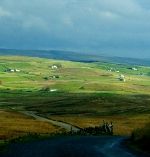Could England’s grasslands store more carbon than forests?
By managing England’s grasslands less intensively, they could potentially store more carbon than forests, finds research from the Grasslands Trust.

In a new report, the Grasslands Trust highlights the importance of grasslands and challenges policy makers to re-examine the importance of this resource and the threats it continues to face. The report ‘Nature’s Tapestry’ identifies the opportunity to massively increase the amount of carbon stored in grassland soils.
The report sets out a series of recommendations which would make a real impact on the Grassland Trust’s mission to halt and reverse the current decline of grasslands – nine tenths of which have been lost in the last 70 years. The report explains why grasslands are important – including the ecosystem services that they provide such as carbon mitigation.
They argue that absorbing CO2 through tree planting has come to be ‘the poster child’ for efforts to fight climate change. There are many carbon offsetting schemes based around tree planting – under the assumption that it successfully locks away carbon as the trees grow. However, recent studies have revealed that England’s semi-natural grasslands actually store more carbon than forests – in fact, at 300 megatonnes of carbon, grasslands lock up 20 per cent of all soil carbon in the UK.
Wildlife rich grasslands store more carbon in their soils than those which are intensively managed –over 3 tonnes/hectare each year of carbon can be sequestered into grasslands, where intensive management has been withdrawn. This is almost as much as is sequestered into Sitka Spruce plantations. The report highlights that if farmers and landowners were able to reduce intensive management practices on grasslands – such as high use of chemical fertiliser – England’s capacity to store carbon in grassland soils, would significantly increase, as well as providing habitat for threatened wildlife, and other critical ‘ecosystem services’ such as crop pollination and water purification.
More info...



_-_frame_at_0m5s_400_250_80_s_c1.jpg)


